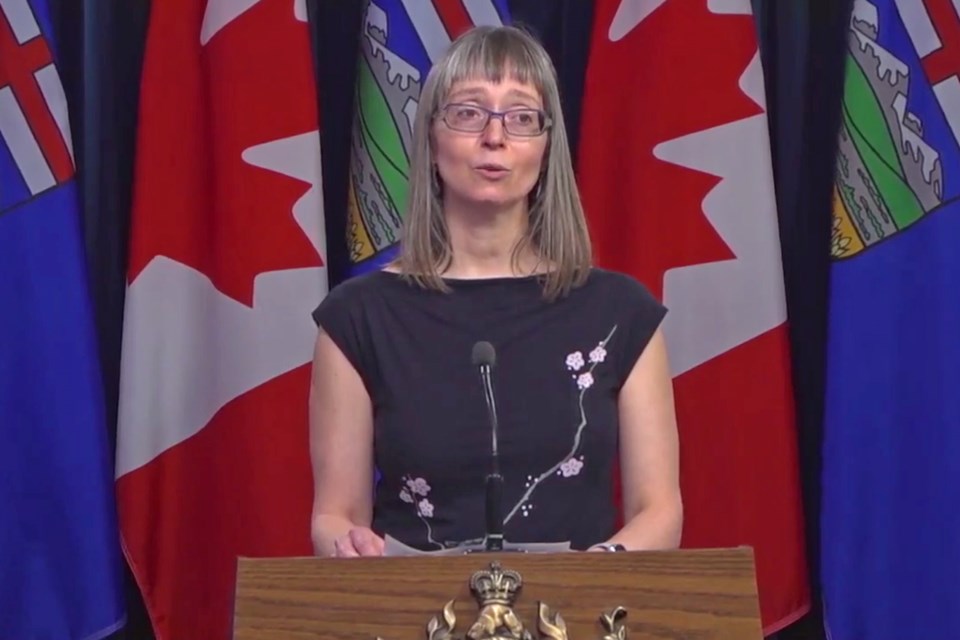BOW VALLEY – A man in his 60s is the first COVID-19 coronavirus related death in Alberta.
The province's Chief Medical Officer of Health Dr. Deena Hinshaw made the announcement on Thursday (March 19).
The man, with underlying medical conditions, was admitted to an intensive care unit (ICU) in Edmonton and died late Wednesday evening (March 18).
“This is extremely sad news,” Hinshaw said. “As heartbreaking as this news is, it was expected. This is a dangerous virus.”
The patient had no ties to travel and appears to have acquired the virus via community transmission.
Hinshaw said there are 27 new cases of COVID-19 in the province, bringing the total number of diagnosed cases to 146. It is suspected that up to eight of these diagnoses occurred through community transmission.
The reported COVID-19 death comes two weeks after the first confirmed case of COVID-19 appeared in the province.
Hinshaw said Alberta Health Services is aware of the types of underlying conditions that can lead to severe outcomes for those infected with the virus. These conditions include hypertension, diabetes, heart conditions and chronic breathing conditions. Those over the age of 65 also face a higher risk from COVID-19.
“We know that people who are older, who have medical conditions, have a higher risk of severe outcomes and death … but sometimes, younger people can still have severe outcomes and death,” Hinshaw said.
“This is not something to be taken likely – that chain of transmission can cause deaths, ICU admissions, hospitalizations. We’re all in this together.”
Hinshaw noted there have been at least two patients diagnosed with COVID-19 who have gone on to fully recover.
At this time it is difficult to determine how many more deaths, cases and hospitalizations are expected, Hinshaw said, explaining it will come down to how hard Albertans work to collectively prevent the spread of the virus.
“[We need] to flatten that curve and make sure that we are limiting the transmission of the virus,” Hinshaw said. “My goal is to keep it as low as possible.”
Reducing the spread of the virus is critical she said, and this is why “aggressive measures” have been put in place by the province. These actions include restrictions on mass gatherings, the closure of public recreation facilities and limits on restaurant capacities, along with encouraging the use of social distancing and self-isolation to limit exposure to the virus.
Hinshaw added the province is working to establish a way to report businesses that do not obey restrictions and those that do not follow self-isolation protocol.
Alberta Health Services is working with the Justice and Solicitor General for a process to enforce all public health measures, and this will include advice on who to contact when these actions are not being followed.
This information will be available “very soon” Hinshaw said and asked that those concerned do not call 911 or 811 at this time.
“In the meantime, if you do see somebody who is not following the recommendations make sure they know how serious this is – the best advice I have right now is to encourage those people to do the right thing,” Hinshaw said. “These measures save lives and it’s really important people understand that this is not to be taken likely.”
The province has expanded the availability of COVID-19 tests growing capacity to more than 2,000 as of Wednesday, Hinshaw said, adding a warning these number will potentially not be sustainable in the long term.
The capacity to test all Albertans who display symptoms will not be feasible in the short to medium term. Hinshaw said that a focus has been placed on testing as many different groups as possible in an effort to find cases.
She added that evidence from the World Health Organization-Chine Joint Mission on Coronavirus released several weeks ago concludes that asymptomatic transmission is extremely rare and not a driver of the outbreak.
At this time, she said it is unclear if people are likely to transmit infection without symptoms. Because of this tests for people without COVID-19 symptoms are currently not available in the province.
“The critical thing in all of these reports is that local public health is following up and making sure that anyone who is at risk is contacted,” Hinshaw said.
For more information visit alberta.ca/covid19 on how to help prevent the spread and recognize the symptoms of COVID-19.






